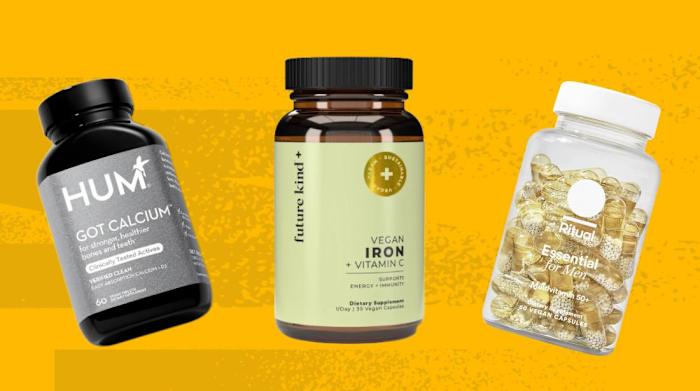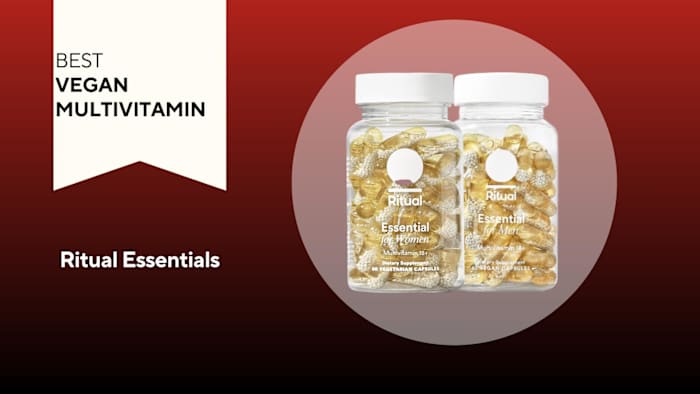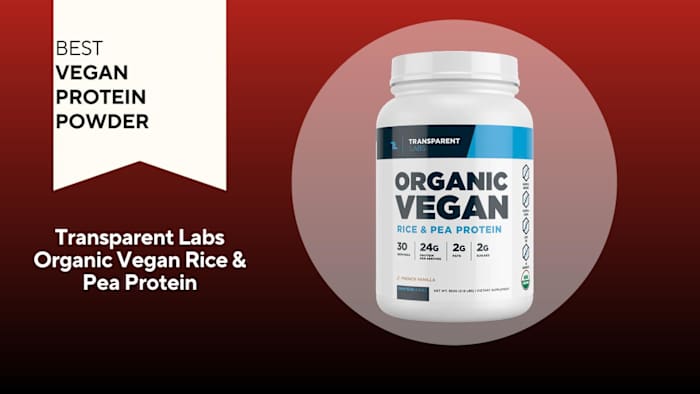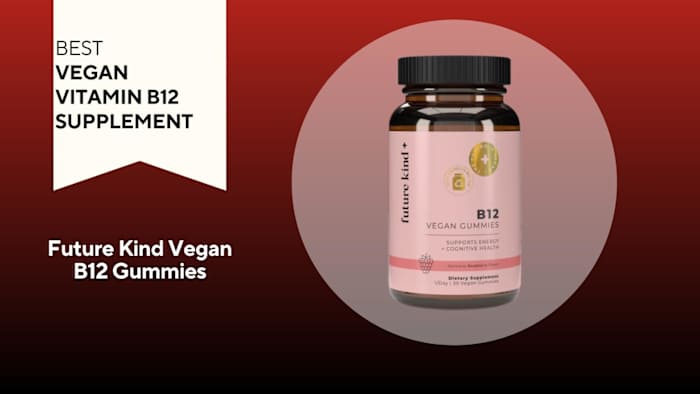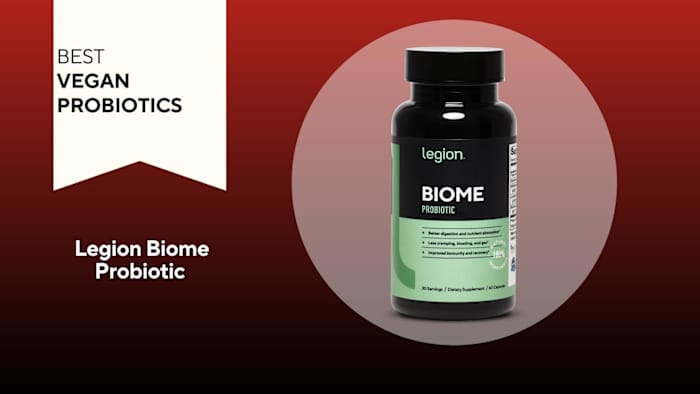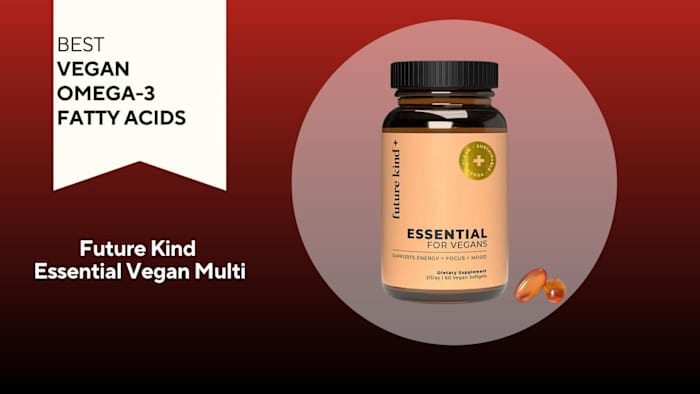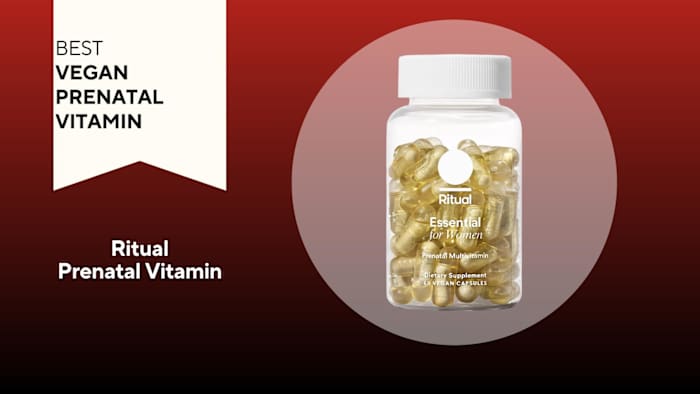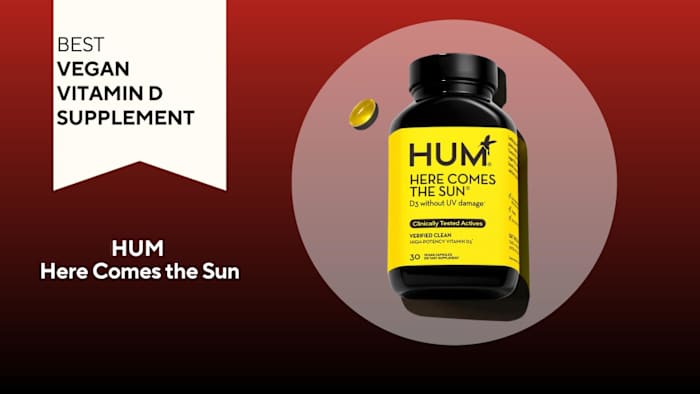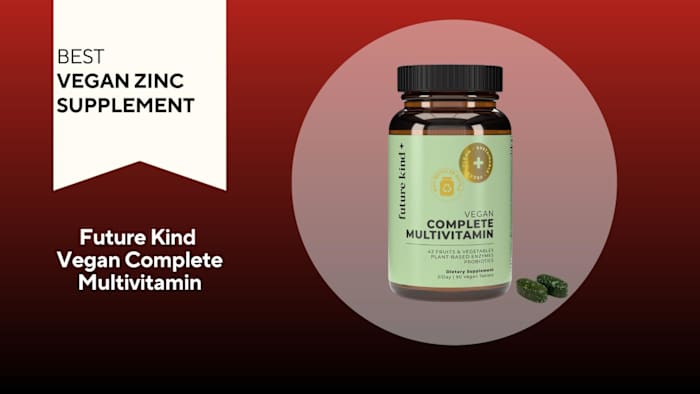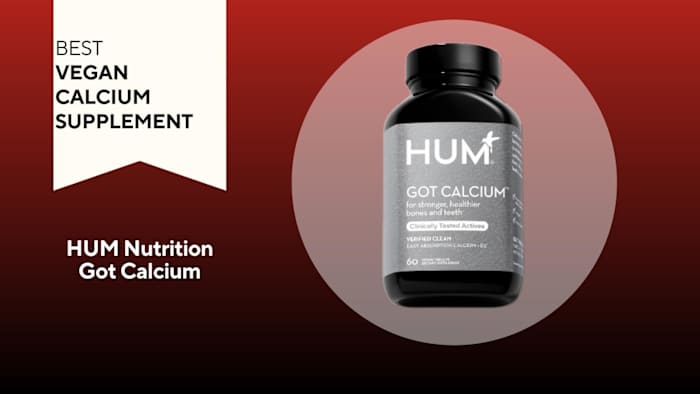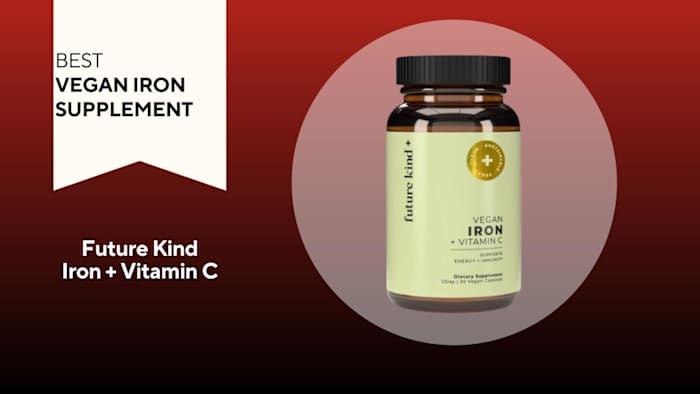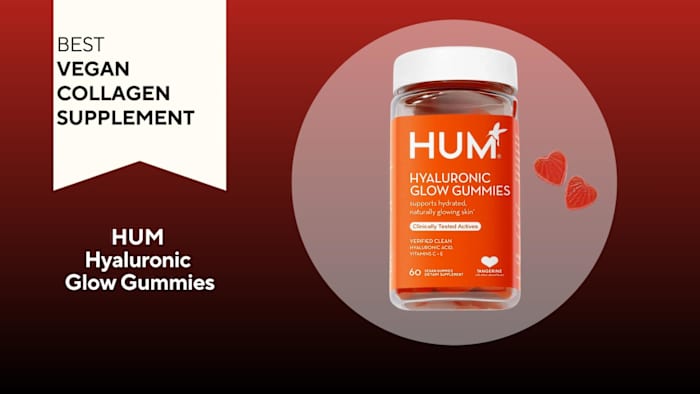The products featured in this article have been independently reviewed. When you buy something through the retail links on this page, we may earn commission at no cost to you, the reader. Sports Illustrated editorial staff are not involved in the creation of this content. Learn more here.
A 2022 survey found that as many as one in 10 Americans are vegan or vegetarian (1). People eliminate meat and animal products from their diet and lifestyle for several reasons. Among them are concerns about their health, the environment and factory farming.
However, when you eliminate whole food groups from your diet, you increase your risk of certain nutrient deficiencies. Some vitamins and minerals are primarily found in meat and dairy products. For instance, heme iron is found only in meat, poultry and seafood (3). Vitamin D3 can be found in fish, eggs and lanolin from sheep’s wool, but it’s more difficult to find in the plant kingdom. Vitamin B12 and EPA/DHA are also found primarily in animal products.
"Vegans can benefit from multivitamin supplementation to make sure they get essential nutrients that might be lacking in a plant-based diet, such as vitamin B12, vitamin D, calcium, iron, omega-3 fatty acids and iodine," says Dr. Raj Dasgupta.
Well-balanced vegan meals can be healthy, but if you need to fill in any gaps in your diet, talk to your doctor about adding a vegan supplement. The market for vegan multivitamins and supplements is booming, reaching $10 billion in 2022 (2), and to make your search easier, we put together this guide to the best vegan vitamins and supplements. Our choices are based on ingredient quality, nutritional value, brand reputation and input from our panel of experts.
This content is meant to be informative, but should not be taken as medical advice. It is not intended for use as diagnosis, prevention or treatment of health problems. Always speak with your doctor before starting any new supplement or exercise regimen.
Our Picks for the Best Vegan Multivitamins and Supplements:
- Best Vegan Multivitamin: Ritual Men’s | Women’s Multivitamin
- Best Vegan Protein Powder: Transparent Labs Organic Vegan Rice & Pea Protein
- Best Vegan Vitamin B12 Supplement: Future Kind Vegan B12 Gummies
- Best Vegan Probiotics: Legion Biome
- Best Vegan Omega-3 Fatty Acids Supplement: Future Kind Essential Vegan Multi
- Best Vegan Prenatal Vitamin: Ritual Prenatal Vitamin
- Best Vegan Vitamin D Supplement: HUM Here Comes the Sun
- Best Vegan Zinc Supplement: Future Kind Complete Vegan Multi
- Best Vegan Calcium Supplement: HUM Nutrition Got Calcium
- Best Vegan Iron Supplement: Future Kind Iron + Vitamin C
- Best Vegan Collagen Supplement: HUM Hyaluronic Glow Gummies
Best Vegan Multivitamin: Ritual Men’s | Women’s Multivitamin
Get 25% off your first month of Ritual! Code: SI25
Key features and specs:
- Best for: Men and women ages 18-49 who want to cover all their nutritional bases, especially women who may become pregnant
- Dose per serving:
- Ritual Essential for Women Multivitamin
- Vitamin D: 50 micrograms | 2,000 international units (IU) | 250 percent daily value (DV)
- Vitamin E: 6.7 milligrams | 45 percent DV
- Folate: 1,000 micrograms dietary folate equivalent (DFE) | 250 percent DV
- Vitamin B12: Eight micrograms | 333 percent DV
- Iron: Eight milligrams | 44 percent DV
- Magnesium: 30 milligrams | Seven percent DV
- Ritual Essential for Men Multivitamin
- Vitamin A: 180 micrograms | 20 percent DV
- Vitamin D3: 50 micrograms | 2,000 IU | 250 percent DV
- Vitamin E: 6.7 milligrams | 45 percent DV
- Folate: 200 micrograms DFE | 50 percent DV
- Vitamin B12: Eight micrograms | 333 percent DV
- Magnesium: 30 milligrams | Seven percent DV
- Zinc: 2.4 milligrams | 22 percent DV
- Servings per bottle: 30
- Form: Capsule
- About the brand: A supplement brand that designs formulas by age and sex; uses traceable ingredients from a sustainable supply chain
Why I picked it:
Multivitamins deliver a moderate dose of essential nutrients. They take your healthy diet to the next level by covering several key minerals and essential vitamins in one capsule or pill. We chose Ritual’s Men’s and Women’s multivitamins as the best vegan multivitamin because they are made from traceable, sustainable, high-quality ingredients. Ritual’s in-house Scientific Advisory Board guides its research and development to ensure their products are clinically sound and scientifically backed.
Ritual’s “smart capsule” design passes the stomach to deliver important nutrients to the gut, where they are best absorbed (4). Also, each clear beadlet-filled capsule is mint-flavored, so taking your vitamins is a more refreshing experience.
Ritual multivitamins can be purchased one bottle at a time through Amazon, but for the best savings, subscribe directly through Ritual for a monthly delivery that costs around $33.
Pros:
- High-quality, traceable ingredients
- Mint-essence makes capsule more palatable
- Offers an easy set-it-and-forget-it subscription option
Cons:
- Not a comprehensive vitamin, since it covers only nine key nutrients
- The Men’s multi does not contain iron
Best Vegan Protein Powder: Transparent Labs Organic Vegan Rice & Pea Protein
Key features and specs:
- Best for: Runners, gym-goers and bodybuilders who want to up their protein intake for performance and muscle recovery (5); those who want to curb hunger (6) and increase metabolism (7) for fat burning
- Dose per serving: 24 grams of protein
- Servings per bottle: 30
- Form: Powder
- About the brand: Committed to clean ingredients, backed by scientific research
Why I picked it:
When you hear the word protein, you probably think of meat and eggs—unless you follow a vegetarian or vegan diet. Plant-based diets need a good source of vegan protein for optimal nutrition. Protein builds and repairs cells and tissues (like muscle[8]), and it also makes enzymes and hormones (9).
The recommended daily allowance (RDA) for healthy adults with minimal physical activity is about one gram of protein per kilogram of body weight (about 70 grams of protein for a 150-pound person [10]) with needs increasing for those who are more regularly active. “Since vegans rely on plant sources for their protein needs, it may be difficult to consume sufficient amounts via food," says Dr. Eddie Jo a professor of exercise physiology and the director of the Cal Poly Pomona Human Performance Research Lab. Moreover, research shows that plant-based protein may be absorbed less efficiently, so those following a vegan diet need more protein to meet their bodies’ needs (11).
Transparent Labs Organic Vegan Rice & Pea Protein is our top pick for the best vegan protein powder in part because it’s made with pea protein, a complete source of protein that contains all nine essential amino acids. Each serving packs 24 grams of all-natural, non-GMO protein without artificial fillers. In addition to pea flour ground from yellow peas (pea protein isolate), it’s made from rice protein. This plant-based protein powder comes in two flavors: French Vanilla and Chocolate.
Related Post: Pea Protein vs Whey Protein: Which Is Better?
Pros:
- Easily digestible
- All natural and organic
- Versatile protein source that can be used in smoothies, baked goods or “proffee” (protein + coffee)
- Isoflavones in pea protein are known to improve heart health (12)
Cons:
- Expensive ($50 for 30 servings)
Best Vegan Vitamin B12 Supplement: Future Kind Vegan B12 Gummies
Key features and specs:
- Best for: Vegans with a vitamin B12 deficiency
- Dose per serving: 500 micrograms of vitamin B12 | 20,834 percent DV
- Servings per bottle: 30
- Form: Gummies
- About the brand: All-vegan supplement line that produces earth-conscious products
Why I picked it:
Vegans and vegetarians are at a significantly higher risk (13) of having a vitamin B12 deficiency than people who eat animal products because B12 is most available in foods like meat, fish, cheese and eggs. You have to be intentional about which supplements you use—and why—to make sure you’re filling any nutritional gaps you might be experiencing.
Multivitamins are an option, but if you’re looking for the best B12 supplement specifically then Future Kind B12 gummies are a great option. These vegan gummies have a very simple formula with 500 micrograms of B12 and two grams of sugar for taste. The source for this B12 is cyanocobalamin, a synthetic form of B12 that will absorb as well as naturally occurring B12 (14).
Future Kind is also a mission-minded company that is dedicated to using sustainable sourcing, recycled material and donating to animal sanctuaries. In addition to their vegan b12 gummy supplement, they have a collection of vegan supplements, including a vegan multivitamin gummy for kids.
Pros:
- 100 percent vegan
- Sustainably sourced ingredients
- All recycled materials in the packaging
- 20% discount with a subscription
Cons:
Some research suggests consuming 500 micrograms of B12 may decrease absorption (14)
Best Vegan Probiotics: Legion Biome
Key features and specs:
- Best for: Those with mild gas or bloating
- Dose per serving: Bifidobacterium lactis B420® (10 billion CFU), Bacillus subtilis DE111® (5 billion CFU), Lactobacillus plantarum 299v® (10 billion CFU)
- Servings per bottle: 30
- Form: Capsule
- About the brand: A sports supplement brand that also branches into fitness coaching and meal plans
Why I picked it:
Probiotics are live microbes found in certain foods like yogurt and some cheeses. When you eat them, they help the body by improving digestion (19), killing bad bacteria and making enzymes and vitamins the body needs. A healthy gut with the right balance of bacteria may also help balance hormones, improve cognitive function and regulate the immune system and digestion (52).
The best vegan probiotic we’ve found is Legion Biome. These capsules deliver 25 billion CFUs of three probiotic strains, Bifidobacterium lactis B420®, Bacillus subtilis DE111® and Lactobacillus plantarum 299v®. It also contains 1,000 milligrams of a prebiotic called PreticX® Xylooligosaccharide, which acts as food for the probiotics. This prebiotic is naturally found in foods like fruits and vegetables, as well as milk and honey, though the xylooligosaccharide in this product is vegan.
Pros:
- Made without artificial ingredients
- Third-party tested for potency and purity
- No-return necessary money-back guarantee
Cons:
- Expensive
- Relatively low CFU count compared to competitors
Best Vegan Omega-3 Fatty Acids Supplement: Future Kind Essential Vegan Multi
Key features and specs:
- Best for: Vegans who struggle to consume enough omega-3 and vegans who want a targeted multivitamin
- Dose per serving: 900 milligrams of Algal Omega-3 Oil (135 milligrams of EPA and 270 milligrams of DHA)
- Servings per bottle: 30
- Form: Softgel
- About the brand: All-vegan supplement line that produces earth-conscious products
Why I picked it:
Omega-3 fatty acids are commonly found in fish and have a ton of health benefits. Most notably, omega-3s have been linked to promoting heart and cardiovascular health (20). Omega-3s are also found in nuts and plant oils, but you would need to consume a lot of those to get your daily recommendation of 1.1 to 1.6 grams (53).
These fatty acids are also important for reducing inflammation and long-term brain health (21), which makes it a necessary part of your supplement regimen. Unlike other nutrients, adequate doses of omega-3s aren’t likely to be included in multivitamins, so additional supplementation may be of benefit.
Future Kind’s Essential Vegan Multivitamin supplement aims to fill in common nutritional gaps among vegans, which is why it contains vitamin B12 and vitamin D in addition to omega-3 fatty acids. Each two-softgel serving has 900 milligrams of omega-3 oil, including 135 milligrams of EPA and 270 milligrams of DHA—the two fatty acids most commonly found in fish and seafood (30).
Future Kind is a company founded by two Australian vegans to address the common nutritional gaps vegans experience while also being committed to other initiatives like sustainable sourcing, developing animal sanctuaries and fully recyclable packaging.
Related Post: The Best Vegan Omega-3 Supplements
Pros:
- Softgels are easy to swallow according to reviews
- 100 percent vegan
- Essenced with citrus
- Free of GMOs, gluten, wheat, yeast, nuts, soy, sugar, salt and artificial colors or preservatives
- Third-party tested by Dyad Labs
Cons:
- Some customers complain of delayed shipments
- Some reviewers say they softgels have an unpleasant odor
Best Vegan Prenatal Vitamin: Ritual Essential Prenatal Vitamin
Get 25% off your first month of Ritual! Code: SI25
Key features and specs:
- Best for: Women who are pregnant, thinking about pregnancy or trying to conceive
- Dose per serving:
- Vitamin D3: 50 micrograms | 2,000 IU | 333 percent DV
- Vitamin E: Seven milligrams | 27 percent DV
- Folate: 1,000 micrograms DFE | 167 percent DV
- Vitamin B12: Eight micrograms | 286 percent DV
- Biotin: 150 micrograms | 429 percent DV
- Choline: 55 milligrams | 10 percent DV
- Iron: 18 milligrams | 67 percent DV
- Iodine: 150 micrograms | 52 percent DV
- Magnesium: 32 milligrams | Eight percent DV
- Boron: 0.7 milligrams
- Omega-3 DHA: 350 milligrams
- Vitamin K2: 90 micrograms
- Servings per bottle: 30
- Form: Capsule
- About the brand: A supplement brand that designs formulas by age and sex; uses traceable ingredients from a sustainable supply chain
Why I picked it:
Pregnancy is a time to be extra sensitive to the body’s needs. Expectant mothers and those recovering from pregnancy need extra nourishment. With those needs in mind, we chose Ritual’s Essential Prenatal as the best prenatal supplement for vegans. The Ritual prenatal provides 12 vitamins and minerals needed during pregnancy, including choline and folate for the baby’s brain (22), and Vitamins D3 and K2 with magnesium to support bone development (23).
Although there are dozens of prenatal brands on the market, this one stands out. Many prenatal tablets are large and have a stale odor, but Ritual’s prenatal comes in an easy-to-swallow gel capsule. The vitamins also come in mint or citrus essence for a pleasant flavor that may soothe those in the early months of morning sickness.
Ritual’s products are third-party tested for purity and potency and sourced from a supply chain you can see on their website. Expectant mothers will have one less thing to worry about knowing their nutrition is from a trusted source.
Check out our Ritual Essential Prenatal review for more information.
Pros:
- Traceable ingredients
- Contains nutrients important during pregnancy, including folate and vitamin D
- Mint or citrus essence
Cons:
- More pricey than drugstore brands (around $39 per month)
Best Vegan Vitamin D Supplement: HUM Here Comes the Sun
Key features and specs:
- Best for: Anyone who has suboptimal levels of vitamin D3
- Dose per serving: 50 micrograms of vitamin D3 (2,000 IU)
- Servings per bottle: 30
- Form: Softgel
- About the brand: A wellness brand that offers targeted supplements that are tested for purity
Why I picked it:
It is estimated that about one billion people around the world have a vitamin D deficiency (15). But deficiency isn’t the only cause for concern. About 50 percent of the global population (35 percent of U.S. adults) have vitamin D insufficiency (15)–the precursor to a deficiency that can be easily addressed with supplements.
The biggest reason that a vitamin D deficiency is dangerous is that your body cannot absorb calcium without it (16), which means your bone health, immune system, skin health and mood all depend on you having the appropriate amount of vitamin D (17). Taking a supplement that contains a good amount of vitamin D3—the form of the vitamin that is naturally produced by humans–needs to be a priority if you’re not getting enough.
HUM Here Comes the Sun softgels have 50 micrograms of D3, which is 250 percent of your DV (18). There is no danger in taking this much D3, but the effectiveness of the dose depends on your level of vitamin D3 insufficiency. You will not gain additional benefits from taking more vitamin D3 than recommended.
Pros:
- High vitamin D3 dose can accommodate a wide range of D3 insufficiency
- Clean Label Project certified and Non-GMO Project Verified
- Vegan formula with vitamin D3 sourced from lichen
- Gluten- and soy-free
- No artificial colors, sweeteners, flavors or preservatives
Cons:
- Relatively expensive for a 30-day supply of vitamin D
Best Vegan Zinc Supplement: Future Kind Complete Vegan Multi
Key features and specs:
- Best for: Those who want a vegan multivitamin with the full DV of zinc; anyone who wants a comprehensive multivitamin; those who want to support their immune system
- Dose per serving: 15 milligrams of zinc
- Servings per bottle: 30
- Form: Tablet
- About the brand: All-vegan supplement line that produces earth-conscious products
Why I picked it:
Zinc is another nutrient that those following a vegan diet should be aware of. It’s a key component of a lot of your body’s functions, such as creating DNA and repairing damaged cells, and it’s vital to a healthy immune system (31). Even though your body needs only about 11 milligrams of zinc (31), vegans are at a higher risk of zinc deficiency because the body doesn’t absorb it well from plant sources (32). “It’s also more prevalent in omnivorous diets,” says Dr. Rob Wildman, RD, LD, CISSN, FISSN. Foods like meat, fish and seafood are high in zinc, but they aren’t part of the vegan diet.
That’s where Future Kind’s Complete Vegan Multi can help you. This comprehensive multivitamin contains 15 milligrams of zinc, which is 136 percent DV and still well below the recommended maximum dose, which is 40 milligrams (33). Additionally, this vegan multivitamin provides 21 other essential vitamins and minerals, including 100 micrograms of vitamin B12 (4,167 percent DV). It also provides 500 milligrams of spirulina, 200 milligrams of wheat grass powder and 20 million CFUs of the probiotic lactobacillus acidophilus, among other wellness ingredients.
Pros:
- Third-party tested for purity by Dyad Labs
- 12 micronutrients with at least 100 percent DV
- Non-GMO and free of gluten, wheat and soy
- Carbon neutral shipping and eco-friendly packaging
- Subscription service available with a 20% discount
Cons:
- Contains proprietary blends (Fruit and Vegetable Blend and Enzyme Complex)
- One serving is three tablets, and some customers complain that the tablets are large and difficult to swallow
Best Vegan Calcium Supplement: HUM Nutrition Got Calcium
Key features and specs:
- Best for: Women who are at higher risk of osteoporosis, especially after menopause (34); anyone with a disorder that affects nutrient absorption, such as inflammatory bowel disease (IBS) or Crohn’s
- Dose per serving: 630 milligrams of calcium | 48 percent DV
- Servings per bottle: 30
- Form: Tablets
- About the brand: A wellness brand that offers targeted supplements that are tested for purity
Why I picked it:
The recommended daily allowance of calcium for adults is 1,000–1,200 milligrams; however, most experts agree that many vegans don’t get enough calcium (35). If your calcium intake is low, or you are at risk for a deficiency, you may benefit from a calcium supplement.
Our choice for the best vegan calcium supplement is HUM Nutrition Got Calcium. It contains 630 milligrams of calcium, plus vitamin D to increase absorption. HUM Nutrition products are gluten-free and non-GMO. They’re also Clean Label Project verified, which means they’re tested for heavy metals, pesticide residues and plasticizers linked to cancers and infertility. What’s more, HUM’s Got Calcium is affordable, costing only $15 per bottle.
Pros:
- Contains vitamin D to support absorption of calcium
- Clean Label Project verified
- Formulated by registered dietitians and nutritionists
Cons:
- Only comes in tablet form, which may be hard to swallow for some
Best Vegan Iron Supplement: Future Kind Iron Supplement with Natural Vitamin C
Key features and specs:
- Best for: Vegans who aren’t eating enough nuts
- Dose per serving:
- Iron: 18 milligrams
- Vitamin C: 50 milligrams
- Servings per bottle: 30
- Form: Capsule
- About the brand: All-vegan supplement line that produces earth-conscious products
Why I picked it:
Iron is a micronutrient that a lot of people struggle to get enough of through diet alone, but those following a vegan diet in particular are susceptible to deficiency because iron is most bioavailable in red meat (36). “An iron deficiency has been linked to lethargy, weakness and breathing difficulties (36),” says Dr. Jo.
That doesn’t mean vegans have to supplement—there is a high amount of iron in dark, leafy greens and several types of nuts (3)—but supplementing with Future Kind’s iron supplement is always a good complement.
Future Kind’s iron supplement has 18 milligrams of iron, which is 100 percent of the recommended daily value (55). Iron plays an incredibly important role in developing hemoglobin (37), which is a protein in red blood cells that carries oxygen to the lungs.
In addition to the 18 milligrams of iron, Future Kind’s supplement also has 50 milligrams of vitamin C. That’s about 55-66 percent of your daily value (37), depending on a few factors like your age and sex. Most people associate vitamin C with your immune system, which is true, but it also helps your body absorb more iron from food and supplements (38).
Pros:
- High dose of iron
- Includes vitamin C to help your body absorb more iron
- 100 percent vegan
- 20% discount with a subscription
Cons:
- Must spend over $70 to get free shipping
Best Vegan Collagen Supplement: HUM Hyaluronic Glow Gummies
Key features and specs:
- Best for: Those following a vegan diet who want a plant-based collagen alternative; those over 50 who want a supplement for skin hydration
- Dose per serving:
- Hyaluronic acid: 120 milligrams
- Amla fruit (Phyllanthus emblica): 5 milligrams
- Vitamin C: 90 milligrams | 100 percent DV
- Vitamin E: 15 milligrams | 100 percent DV
- Servings per bottle: 30
- Form: Gummy
- About the brand: A wellness brand that offers targeted supplements that are tested for purity
Why I picked it:
Collagen is a protein found in connective tissues (skin, ligaments and bones). Research shows that collagen may reduce wrinkles and signs of skin aging (24). Collagen also supports healthy joints, muscle recovery and heart health (25)(26)(27).
Since those following a vegan diet don’t consume food sources high in collagen, and the vast majority of collagen supplements are animal-based, vegans may benefit from a supplement designed to boost their natural collagen levels.
Our pick for the best vegan collagen supplement is HUM Hyaluronic Glow Gummies. Instead of genetically engineered vegan collagen found in other products (28), these HUM gummies are formulated with hyaluronic acid, amla fruit, vitamin C and vitamin E. Hyaluronic acid supports skin hydration and works with collagen and elastin to maintain the volume, moisture and elasticity of skin (56)(57). Amla fruit (a.k.a Indian gooseberry) may help protect the skin from UV rays and support collagen production (58)(59). Vitamins C and E are important nutrients for maintaining healthy skin (29).
Pros:
- Formulated by Registered Dietitians (RDs)
- Clean Label Project certified and Non-GMO Project verified
- Free of artificial colors, sweeteners, flavors and preservatives
- Vegan gummy formula made with tapioca syrup, vegetable glycerin and pectin
Cons:
- Formula does not contain copper, which is necessary to build collagen (54)
- Two grams of sugar per serving
How to Choose the Best Vegan Vitamins and Supplements For You
Ingredients
To choose a vegan vitamin or supplement, first check out the ingredients label. Products labeled “vegan” should be free from any animal products like gelatin, which comes from animal skin and bones. Also be aware that some vitamins and supplements can interact with medicines. Here are a few to consider:
- Vitamin K affects blood clotting and interacts with blood-thinner medications like warfarin (39).
- Vitamin A interacts with retinoids found in acne medications like Accutane (40).
- Vitamin B6 decreases the action of phenytoin for seizures and levodopa for Parkinson’s (41).
- B-complex niacin can interact with statins used to treat cholesterol (42).
To be safe, take your supplement to your doctor so he or she can check the ingredients, let you know of any potential interactions and recommend a safe dose.
Dosages
Getting the right dose of vitamins and supplements can be tricky, considering every person has unique nutritional needs based on age, sex, lifestyle and other factors. To complicate matters, dosages vary among the different supplement brands and products. Consider these guidelines when looking for supplements:
- Water-soluble vitamins (B vitamins and Vitamin C) are hard to over-consume, since the body flushes out any excess.
- Fat-soluble vitamins (Vitamins A, D, E and K) are stored in fat tissue and can be dangerous if over-consumed.
- Minerals (calcium, copper, iodine, iron, magnesium and selenium) may be toxic at high doses.
“Many of these cautions are based on consistent intake over time,” notes Dr. Wildman. In other words, consuming a high dose of a mineral like magnesium on one day is unlikely to be toxic. You can find the daily recommended intake for many nutrients online (43). We also recommend asking your doctor what dose is best for you.
Form
Vegan multivitamins and supplements come in a wide array of forms, including capsules, gummies, powders, softgels, sprays and tablets. Generally speaking, all of these forms can get the job done, so your choice should come down to preference. Consider where and when you will take your supplement. At home or on the go? Some forms may require refrigeration. Others may need to be measured out.
Third-party testing
When shopping for vegan supplements and multivitamins, you’ll come across different stamps and seals of approval. The three designations that we consider to be the top tier in supplements are:
- NSF Certified: This indicates that the company adheres to strict quality standards and undergoes regular on-site inspections.
- NSF Certified for Sport: This indicates that the product is free of banned substances.
- USP Certified: This indicates that the product contains the ingredients listed on the label and is free from harmful contaminants.
- Consumer Labs Approved: This indicates that the supplement has been tested for identity, potency, purity and disintegration (can be used by the body).
In many cases, certifications and verifications by outside organizations can be a good thing. The benefit of third-party testing is assurance that the product has been inspected and analyzed for safety and quality. However, certifications are expensive to obtain. Sometimes, the company passes that cost onto the consumer by offering the supplement at a higher price. Another drawback is that smaller companies may not be able to afford certifications or verifications even though they have a stellar product.
Price
The prices of vegan multivitamins and supplements vary quite a bit. Probiotics and protein supplements are the most expensive. Multivitamins are mid-range in cost, and single-nutrient products are the least expensive. The supplements on our list range from $0.10 per serving (Garden of Life myKind Organics B12) to $1.66 per serving (Transparent Labs Vegan Protein).
Customer Reviews
It’s usually helpful to read online customer reviews. This will give you an idea of what people like or don’t like about a product. Check out the company’s website, Amazon and Google for customer reviews.
Methodology: How We Chose the Best Vegan Multivitamins and Supplements
We chose products for our list of the best vegan multivitamins and supplements based on a number of factors reflected partly in our multivitamin and plant-protein scoring methodologies. These include:
- Multivitamin scoring methodology: We assess multivitamin formulas across four expert-chosen categories: key nutrients, nutrient doses, third-party testing certifications and price. The testing algorithm for multivitamins produces scores for men and women separately, since each have different RDAs for key nutrients. Multivitamin products can earn bonus credits for sustainable packaging, an organic certification and transparent labeling (no proprietary blends).
- Plant protein scoring methodology: We assess plant-protein powders across six expert-chosen categories: protein source, whether or not the supplement has a complete protein source (containing all nine essential amino acids), macronutrient calories per serving, total protein per serving, price per gram of protein and sweeteners. Plant protein powders can earn bonus credits for third-party testing, the inclusion of enzymes for digestion, an organic certification, sustainable packaging and transparent labeling (no proprietary blends).
For standalone vitamin or wellness supplements, we relied on the following categories:
- Common nutrient deficiencies: We prioritized supplements with nutrients that those following a vegan diet may not consume enough of through food.
- Nutritional dosing: We chose supplements with recommended amounts of the key nutrients included in the product formula.
- Customer reviews: We paid close attention to patterns in customer reviews about the products we considered for this list. The products that made the final cut all have mostly positive reviews averaging at or above 4.5/5 stars.
- Cost: We tried to include accessibly priced products, while also including products with a range of costs.
Finally, we receive input from our panel of expert contributors, which includes registered dietitians and highly credentialed experts in sports nutrition and exercise science.
Learn more about our nutrition and supplement review process, as well as our scoring methodologies for men's multivitamins, women's multivitamins and plant protein powders.
Who May Benefit From a Vegan Supplement?
According to Dr. Dasgupta, the following groups may benefit from a vegan supplement:
- Those following a vegan or vegetarian diet
- Women who are breastfeeding or pregnant
- Elderly people
- Those with limited food variety due to allergies
- Those with gut disorders such as Crohn’s disease, IBS or celiac disease
- People who have had gastric surgery
- Athletes, bodybuilders and very active people with greater nutrient needs
- People who do not eat a balanced diet
- Those with cancer or chronic medical conditions
Who May Not Benefit From a Vegan Supplement?
Dr. Dasgupta notes that the following types of people may not benefit from a vegan multivitamin:
- Those with a well-balanced diet
- People with medical conditions (unless advised by your doctor)
- Those prone to over-supplementation
- Those with specific allergies/intolerances to supplement ingredients
In general, healthy adults who eat a colorful, balanced diet with a variety of plant-based foods may not need a vegan supplement. Their risk for nutritional deficiency is low, but they should still check with their healthcare provider about potential deficiencies.
What Are the Most Important Supplements for Vegans?
Vitamin B12
Vitamin B12 naturally occurs in meat and dairy products, so those following a vegan diet should be screened for B12 deficiency (44), since they consume little dietary vitamin B12. This is especially true for those over age 60, since absorption decreases with age.
Vitamin D
Vitamin D comes mainly from fish and dairy products. Our skin also makes vitamin D when it’s exposed to the sun. Vegans and vegetarians who don’t get enough sunlight to make sufficient vitamin D can benefit from a supplement.
Omega-3 fatty acids
Omega-3 fatty acids are important to the structure of our cells. Two Omega-3s (DHA and EPA) are found in cold-water fish and can also be harvested from algae. Vegans may become deficient without a supplement.
Iron
Those following a vegan diet, especially women in their childbearing years, are prone to low iron levels. Iron comes in two forms, heme and non-heme. Humans absorb heme iron best, but it comes from animal products. A mineral supplement can increase the iron in your blood and ward off deficiency. Note that original research shows vitamin C may increase the absorption of non-heme iron, however, the newest research states it only provides equivocal results (46). Next time you enjoy a plate of iron-rich broccoli or greens (47), drizzle it with vitamin C-rich lemon juice, or enjoy it with a side of red or yellow veggies, to boost the absorption of your iron intake.
Calcium
Calcium is essential for strong bones, yet two of the richest sources of calcium, cheese and milk, are eliminated from the vegan diet. Those who find it hard to reach the recommended 1,000–1,200 milligram DV may want to take a calcium supplement.
Zinc
Nuts and seeds are high in zinc, but some who follow a vegan diet still may not get enough of it in their diets. Men who get less than 11 milligrams and women who get less than eight milligrams each day could benefit from a zinc supplement or a multivitamin containing zinc.
Iodine
For those following a vegan diet, the two main iodine sources are table salt and seaweed (48). Adults who find it hard to meet the 150-microgram daily recommendation could benefit from a multivitamin supplement to cover their mineral needs.
Vegan Multivitamins and Supplements FAQs
What makes a multivitamin or supplement vegan?
For a multivitamin or supplement to be considered vegan, it must not contain animal products or by-products. Vegan Action-certified vegan products are also not tested on animals.
How do vegans get all the nutrients they need?
If you strictly follow a vegan diet, it’s important to work with a healthcare provider to make sure you’re getting adequate amounts of all nutrients. Vegans can get the nutrients they need from eating a balanced diet with diverse foods, including grains, legumes, fruits, vegetables, nuts and seeds, but that doesn’t mean they do. Awareness of your nutrient needs and the nutritional content in your foods can prevent deficiencies over time.
Do vegans need supplements?
Experts say that well-planned vegan diets are healthful and nutritionally adequate (49). However, studies show that vegans may be at increased risk of micronutrient deficiencies (50).
What deficiencies are vegans at risk of?
Vegans are at risk of certain vitamin and mineral deficiencies (51), including niacin (vitamin B3), iodine, zinc, calcium, potassium, selenium and vitamins D, B2 and B12.
Final Thoughts
A balanced, well-planned vegan diet may meet your body’s nutritional needs, but veganism is still associated with an increased risk of certain nutrient deficiencies. With help from your trusted doctor or registered dietitian, this list of the best vegan supplements and vitamins will help guide you to the right products for your overall health and well-being.
Expert Contributors
Chris Mohr, RD, Ph.D.
Chris Mohr is a registered dietitian who holds a Ph.D. in exercise physiology. He has worked with athletes ranging from NFL players to WWE wrestlers, along with celebrities and executives worldwide. He has been a featured speaker at many conferences around the world.
Raj Dasgupta, MD, FACP, FCCP, FAASM
Dr. Raj is a quadruple board-certified physician by the American Board of Internal Medicine, specializing in internal medicine, pulmonology, critical care and sleep medicine. He is also an active clinical researcher with more than 20 years of experience teaching around the world.
Jenevieve Roper, Ph.D, CSCS.
Dr. Jen Roper is an Associate Professor of Health and Human Sciences at Loyola Marymount University. She received her PhD in Physical Education, Sports and Exercise Science in 2015 from the University of New Mexico, with a specialization in Exercise Science and Biomechanics. She currently teaches a wide variety of courses, including Nutrition, Kinesiology and Scientific Principles of Strength & Conditioning.
Eddie Jo, Ph.D.
Dr. Eddie Jo is a professor of exercise physiology and the director of the Cal Poly Pomona Human Performance Research Lab. His research serves to innovate and advance the application of exercise training methodologies, nutrient intake and technologies for the optimization of human health and performance, energy metabolism, body composition and endocrine function.
Tim Ziegenfuss, PhD, CSCS, FISSN
Tim Ziegenfuss, PhD, CSCS, FISSN, is a standout in the world of sports nutrition and exercise science, bolstered by graduate degrees from Purdue University and Kent State University. Beyond academia, he's an influential driver of change on a global scale, serving as a Past President and Fellow of The International Society of Sports Nutrition, steering the field toward higher standards. As CEO of The Center for Applied Health Sciences, his focus is overseeing innovative research with real-world impact and guiding product ideation and creation for major retailers all around the world.
References
- Bir, C., & Norwood, B. F. (2022). Alliance for Science. 1 in 10 Americans say they don’t eat meat – a growing share of the population. https://allianceforscience.org/blog/2022/03
- Polaris Market Research. (2022). Demand for Global Vegan Supplements Market Size Projected to Reach USD 22.11 Billion by 2030, With 10.35% CAGR Growth: Polaris Market Research.Expert Contributors. https://www.prnewswire.com/news-releases/
- Harvard T.H. Chan. (2023). Iron. School of Public Health. https://www.hsph.harvard.edu/nutritionsource/iron/
- Kiela, P. R., & Ghishan, F. K. (2016). Physiology of Intestinal Absorption and Secretion. Best practice & research. Clinical gastroenterology, 30(2), 145–159. https://doi.org/10.1016/j.bpg.2016.02.007
- Cintineo, H. P., Arent, M. A., Antonio, J., & Arent, S. M. (2018). Effects of Protein Supplementation on Performance and Recovery in Resistance and Endurance Training. Frontiers in nutrition, 5, 83. https://doi.org/10.3389/fnut.2018.00083
- Leidy, H. J., Tang, M., Armstrong, C. L., Martin, C. B., & Campbell, W. W. (2011). The effects of consuming frequent, higher protein meals on appetite and satiety during weight loss in overweight/obese men. Obesity (Silver Spring, Md.), 19(4), 818–824. https://doi.org/10.1038/oby.2010.203
- Johnston, C. S., Day, C. S., & Swan, P. D. (2002). Postprandial thermogenesis is increased 100% on a high-protein, low-fat diet versus a high-carbohydrate, low-fat diet in healthy, young women. Journal of the American College of Nutrition, 21(1), 55–61. https://doi.org/10.1080/07315724.2002.10719194
- Thomson, R. L., & Buckley, J. D. (2011). Protein hydrolysates and tissue repair. Nutrition research reviews, 24(2), 191–197. https://doi.org/10.1017/S0954422411000084
- Lewis T, Stone WL. Biochemistry, Proteins Enzymes. [Updated 2023 Apr 24]. In: StatPearls [Internet]. Treasure Island (FL): StatPearls Publishing; 2023 Jan-. Available from: https://www.ncbi.nlm.nih.gov/books/NBK554481/
- Wu G. (2016). Dietary protein intake and human health. Food & function, 7(3), 1251–1265. https://doi.org/10.1039/c5fo01530h
- Berrazaga, I., Micard, V., Gueugneau, M., & Walrand, S. (2019). The Role of the Anabolic Properties of Plant- versus Animal-Based Protein Sources in Supporting Muscle Mass Maintenance: A Critical Review. Nutrients, 11(8), 1825. https://doi.org/10.3390/nu11081825
- Ndiaye, F., Vuong, T., Duarte, J., Aluko, R. E., & Matar, C. (2012). Anti-oxidant, anti-inflammatory and immunomodulating properties of an enzymatic protein hydrolysate from yellow field pea seeds. European journal of nutrition, 51(1), 29–37. https://doi.org/10.1007/s00394-011-0186-3
- Rizzo, G., Laganà, A. S., Rapisarda, A. M., La Ferrera, G. M., Buscema, M., Rossetti, P., Nigro, A., Muscia, V., Valenti, G., Sapia, F., Sarpietro, G., Zigarelli, M., & Vitale, S. G. (2016). Vitamin B12 among Vegetarians: Status, Assessment and Supplementation. Nutrients, 8(12), 767. https://doi.org/10.3390/nu8120767
- NIH. (2021). Vitamin B12. Office of Dietary Supplements. https://ods.od.nih.gov/factsheets/VitaminB12-Consumer/
- Cleveland Clinic. (2022). Vitamin D Deficiency. https://my.clevelandclinic.org/health/diseases/15050-vitamin-d-vitamin-d-deficiency
- Mayo Clinic. (2023). Vitamin D. https://www.mayoclinic.org/drugs-supplements-vitamin-d/art-20363792
- Harvard T.H. Chan. (2023). Vitamin D. School of Public Health. https://www.hsph.harvard.edu/nutritionsource/vitamin-d/
- NIH. (2022). Vitamin D. Office of Dietary Supplements. https://ods.od.nih.gov/factsheets/VitaminD-HealthProfessional/
- NIH. (2022). Probiotics: What You Need To Know. National Center for Complementary and Integrative Health. https://www.nccih.nih.gov/health/probiotics-what-you-need-to-know
- Harvard T.H. Chan. (2023). The Nutrition Source, Omega-3 Fatty Acids: An Essential Contribution. https://www.hsph.harvard.edu/nutritionsource/what-should-you-eat/
- DiNicolantonio, J. J., & O'Keefe, J. H. (2020). The Importance of Marine Omega-3s for Brain Development and the Prevention and Treatment of Behavior, Mood, and Other Brain Disorders. Nutrients, 12(8), 2333. https://doi.org/10.3390/nu12082333
- Irvine, N., England-Mason, G., Field, C. J., Dewey, D., & Aghajafari, F. (2022). Prenatal Folate and Choline Levels and Brain and Cognitive Development in Children: A Critical Narrative Review. Nutrients, 14(2), 364. https://doi.org/10.3390/nu14020364
- Jouanne, M., Oddoux, S., Noël, A., & Voisin-Chiret, A. S. (2021). Nutrient Requirements during Pregnancy and Lactation. Nutrients, 13(2), 692. https://doi.org/10.3390/nu13020692
- Choi, F. D., Sung, C. T., Juhasz, M. L., & Mesinkovsk, N. A. (2019). Oral Collagen Supplementation: A Systematic Review of Dermatological Applications. Journal of drugs in dermatology : JDD, 18(1), 9–16. https://pubmed.ncbi.nlm.nih.gov/30681787/
- Moskowitz R. W. (2000). Role of collagen hydrolysate in bone and joint disease. Seminars in arthritis and rheumatism, 30(2), 87–99. https://doi.org/10.1053/sarh.2000.9622
- Khatri, M., Naughton, R. J., Clifford, T., Harper, L. D., & Corr, L. (2021). The effects of collagen peptide supplementation on body composition, collagen synthesis, and recovery from joint injury and exercise: a systematic review. Amino acids, 53(10), 1493–1506. https://doi.org/10.1007/s00726-021-03072-x
- Jalili, Z., Jalili, F., Moradi, S., Bagheri, R., Moosavian, S. P., Naeini, F., Mohammadi, H., Mojtaba Ghoreishy, S., Wong, A., Travica, N., Hojjati Kermani, M. A., & Jalili, C. (2023). Effects of collagen peptide supplementation on cardiovascular markers: a systematic review and meta-analysis of randomised, placebo-controlled trials. The British journal of nutrition, 129(5), 779–794. https://doi.org/10.1017/S0007114522001301
- Báez, J., Olsen, D. & Polarek, J.W. Recombinant microbial systems for the production of human collagen and gelatin. Appl Microbiol Biotechnol 69, 245–252 (2005). https://doi.org/10.1007/s00253-005-0180-x
- Park K. (2015). Role of micronutrients in skin health and function. Biomolecules & therapeutics, 23(3), 207–217. https://doi.org/10.4062/biomolther.2015.003
- National Institutes of Health. (2017). Office of Dietary Supplements - Omega-3 Fatty Acids. Nih.gov. https://ods.od.nih.gov/factsheets/Omega3FattyAcids-Consumer/
- Harvard T.H Chan. (2023). Zinc. School of Public Health. https://www.hsph.harvard.edu/nutritionsource/zinc
- Foster, M., Chu, A., Petocz, P., & Samman, S. (2013). Effect of vegetarian diets on zinc status: a systematic review and meta-analysis of studies in humans. Journal of the science of food and agriculture, 93(10), 2362–2371. https://doi.org/10.1002/jsfa.6179
- Mayo Clinic. (2023). Zinc. https://www.mayoclinic.org/drugs-supplements-zinc
- Lamy, O., & Burckhardt, P. (2014). Calcium revisited: part II calcium supplements and their effects. BoneKEy reports, 3, 579. https://doi.org/10.1038/bonekey.2014.74
- Chuang, T. L., Lin, C. H., & Wang, Y. F. (2020). Effects of vegetarian diet on bone mineral density. Tzu chi medical journal, 33(2), 128–134. https://doi.org/10.4103/tcmj.tcmj_84_20
- Mayo Clinic. (2022). Iron deficiency anemia. https://www.mayoclinic.org/diseases-conditions/iron-deficiency-anemia/symptoms-causes/syc-20355034
- NIH. (2022). Iron. Office of Dietary Supplements. https://ods.od.nih.gov/factsheets/Iron-Consumer/
- Mayo Clinic. (2022). Nutrition and healthy eating. https://www.mayoclinic.org/healthy-lifestyle/nutrition-and-healthy-eating
- Li, N., Zhao, G., Wu, W., Zhang, M., Liu, W., Chen, Q., & Wang, X. (2020). The Efficacy and Safety of Vitamin C for Iron Supplementation in Adult Patients With Iron Deficiency Anemia: A Randomized Clinical Trial. JAMA network open, 3(11), e2023644. https://doi.org/10.1001/jamanetworkopen.2020.23644
- Crader MF, Johns T, Arnold JK. Warfarin Drug Interactions. [Updated 2023 May 1]. In: StatPearls [Internet]. Treasure Island (FL): StatPearls Publishing; 2023 Jan-. Available from: https://www.ncbi.nlm.nih.gov/books/NBK441964/
- LiverTox: Clinical and Research Information on Drug-Induced Liver Injury [Internet]. Bethesda (MD): National Institute of Diabetes and Digestive and Kidney Diseases; 2012-. Retinoids. [Updated 2020 Nov 10]. Available from: https://www.ncbi.nlm.nih.gov/books/NBK548568/
- St. Luke's Hospital. (2023). Possible Interactions with: Vitamin B6 (Pyridoxine). https://www.stlukes-stl.com/health-content/medicine/33/000992.htm
- Mayo Clinic. Simvastatin And Niacin. https://www.mayoclinic.org/drugs-supplements/simvastatin-and-niacin-oral-route/side-effects
- FDA. (2023). Nutritional Daily Values. https://www.fda.gov/media/99069/download
- Pawlak, R., Lester, S. E., & Babatunde, T. (2014). The prevalence of cobalamin deficiency among vegetarians assessed by serum vitamin B12: a review of literature. European journal of clinical nutrition, 68(5), 541–548. https://doi.org/10.1038/ejcn.2014.46
- Lynch, S. R., & Cook, J. D. (1980). Interaction of vitamin C and iron. Annals of the New York Academy of Sciences, 355, 32–44. https://doi.org/10.1111/j.1749-6632.1980.tb21325.x
- American Red Cross. Iron-Rich Foods. https://www.redcrossblood.org/donate-blood/blood-donation-process
- NIH. (2022). Iodine. https://ods.od.nih.gov/factsheets/Iodine-Consumer/
- Melina, V., Craig, W., & Levin, S. (2016). Position of the Academy of Nutrition and Dietetics: Vegetarian Diets. Journal of the Academy of Nutrition and Dietetics, 116(12), 1970–1980. https://doi.org/10.1016/j.jand.2016.09.025
- Bakaloudi, D. R., Halloran, A., Rippin, H. L., Oikonomidou, A. C., Dardavesis, T. I., Williams, J., Wickramasinghe, K., Breda, J., & Chourdakis, M. (2021). Intake and adequacy of the vegan diet. A systematic review of the evidence. Clinical nutrition (Edinburgh, Scotland), 40(5), 3503–3521. https://doi.org/10.1016/j.clnu.2020.11.035
- Bakaloudi, D. R., Halloran, A., Rippin, H. L., Oikonomidou, A. C., Dardavesis, T. I., Williams, J., Wickramasinghe, K., Breda, J., & Chourdakis, M. (2021). Intake and adequacy of the vegan diet. A systematic review of the evidence. Clinical nutrition (Edinburgh, Scotland), 40(5), 3503–3521. https://doi.org/10.1016/j.clnu.2020.11.035
- Khalesi, S., Bellissimo, N., Vandelanotte, C., Williams, S., Stanley, D., & Irwin, C. (2018). A review of probiotic supplementation in healthy adults: helpful or hype? European Journal of Clinical Nutrition, 73(1), 24–37. https://doi.org/10.1038/s41430-018-0135-9
- Consuming about 3 grams of omega-3 fatty acids a day may lower blood pressure. (n.d.). Www.heart.org. https://www.heart.org/en/news/2022/06/01/consuming-about-3-grams-of-omega-3-fatty-acids-a-day-may-lower-blood-pressure
- Mount Sinai. (n.d.). Copper Information | Mount Sinai - New York. Mount Sinai Health System. https://www.mountsinai.org/health-library/supplement/copper
- National Institutes of Health. (2022, April 5). Office of Dietary Supplements - Iron. Nih.gov. https://ods.od.nih.gov/factsheets/Iron-HealthProfessional
- Papakonstantinou, E., Roth, M., & Karakiulakis, G. (2012). Hyaluronic acid: A key molecule in skin aging. Dermato-Endocrinology, 4(3), 253–258. https://doi.org/10.4161/derm.21923
- MD, P. P., & MD, M. M. S. (2023, April 12). Considering collagen drinks and supplements? Harvard Health. https://www.health.harvard.edu/blog/considering-collagen-drinks-and-supplements-202304122911
- Majeed, M., Bhat, B., Anand, S., Sivakumar, A., Paliwal, P., & Geetha, K. G. (2011). Inhibition of UV-induced ROS and collagen damage by Phyllanthus emblica extract in normal human dermal fibroblasts. Journal of Cosmetic Science, 62(1), 49–56. https://pubmed.ncbi.nlm.nih.gov/21443845/
- Fujii, T., Wakaizumi, M., Ikami, T., & Saito, M. (2008). Amla (Emblica officinalis Gaertn.) extract promotes procollagen production and inhibits matrix metalloproteinase-1 in human skin fibroblasts. Journal of Ethnopharmacology, 119(1), 53–57. https://doi.org/10.1016/j.jep.2008.05.039
These statements have not been evaluated by the Food and Drug Administration. These products are not intended to diagnose, treat, cure, or prevent any diseases.
Prices are accurate and items in stock as of publish time.
